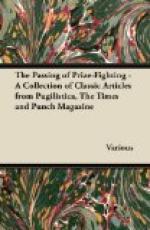Mr. S.P.B. MAIS, in a dedicatory letter to Interlude (CHAPMAN AND HALL), tells us that he has “simply tried to show what a man constituted like Shelley would have made of his life had he bean alive in 1917.” Without any doubt his attempt has succeeded. I am, however, bound to add this warning (if Mr. MAIS’S is not enough), that a novel with such a purpose is not, and could not be, milk for babes. Nothing that I had previously read of Mr. MAIS’S had prepared me for the proficiency he shows here. Obviously attached to the modern school of novelists, he has many of its faults and more of its virtues. One may accept his main point of view, yet be offended sometimes by his details. But the fact remains that in Geoffrey Battersby he has given us a piece of character-drawing almost flawlessly perfect. Not for a very long time has it been my good fortune to attend such a triumph, and I wish to proclaim it. The women by whom Geoffrey, the weak and the wayward, was attracted hither and thither are also well drawn; but here Mr. MAIS shows his present limitations. Nevertheless I feel sure that he has within him the qualities that go to make a great novelist, and that if he will free himself from certain marked prejudices his future lies straight and clear before him.
* * * * *
It was a happy idea of the Sisters MARY and JANE FINDLATER to call their new book of short stories Seen and Heard (SMITH, ELDER), with the sub-title, Before and After 1914. I say short stories, but actually these have so far outgrown the term that a half-dozen of them make up the volume. They are all examples of the same gentle and painstaking craft that their writers have before now exhibited elsewhere. Here are no sensational happenings; the drama of the tales is wholly emotional. My own favourites are the first, called “The Little Tinker,” a half-ironical study of the temptation of a tramp mother to surrender her child to the blessings of civilisation; and how, by the intervention of a terrible old woman, the queen of the tribe, this momentary weakness was overcome. My other choice, the last tale in the collection (and the only one contributed by Miss MARY FINDLATER), is a dour little comedy of the regeneration, through poverty and hard work, of two underemployed and unpleasant elderly ladies. A restful book, such as will keep no one awake at nights, but will give pleasure to all who appreciate slight studies of ordinary life sketched with precise and careful finish.
* * * * *




